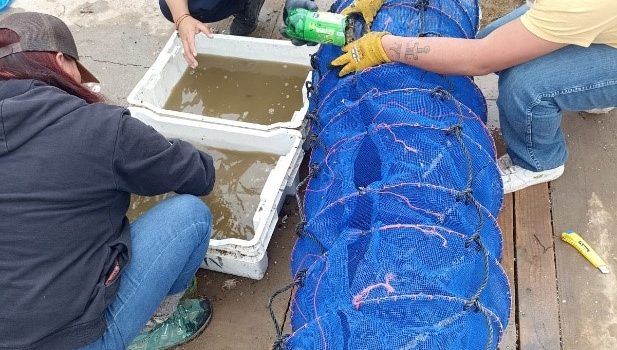IFOP’s Repopulation and Cultivation Department carries out oyster splitting in small-scale aquaculture, in Chungungo B management area.
November 15th, 2023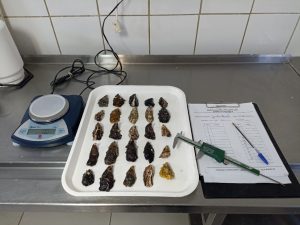 The splitting is done to generate greater growth in the oysters. The lanterns are changed when they are already dirty, so that the organism has greater access to food, which helps the optimal development of the oysters.
The splitting is done to generate greater growth in the oysters. The lanterns are changed when they are already dirty, so that the organism has greater access to food, which helps the optimal development of the oysters.
The Repopulation and Cultivation Department team from Fisheries Development Institute (IFOP) carried out, together with Los Castillo organization, the development of its Small-Scale Aquaculture (APE) of Japanese oyster (Crassostrea gigas).
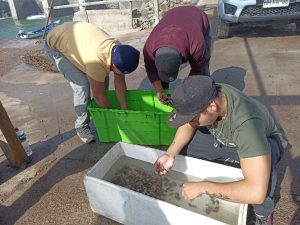 Within the framework of stage VII of the “Comprehensive Aquaculture Development Program for Artisanal Fishermen and Small-Scale Aquaculturists”. The repopulation and cultivation team sought to fulfill its objectives of developing APE pilot crops; and carry out dissemination and transfer actions to support the development of the APE, through technical assistance to the Organization of Artisanal Fishermen (OPA) of Chungungo, Los Castillo.
Within the framework of stage VII of the “Comprehensive Aquaculture Development Program for Artisanal Fishermen and Small-Scale Aquaculturists”. The repopulation and cultivation team sought to fulfill its objectives of developing APE pilot crops; and carry out dissemination and transfer actions to support the development of the APE, through technical assistance to the Organization of Artisanal Fishermen (OPA) of Chungungo, Los Castillo.
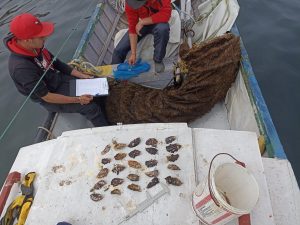 On January 20th, 2023, 12,000 Japanese oyster seeds of approximately 0.5 cm in length were sown. These seeds were produced by Cultivos NANAKU of Tongoy and then transferred to Chungungo, where they were initially sown in 3 cultivation lanterns with a 4 mm mesh opening due to the size of the seed. These lanterns were transferred to the cultivation lines at AMERB Chungungo B, where monitoring has been carried out in which the members of OPA themselves keep track of the variables, through the purchase of measuring instruments.
On January 20th, 2023, 12,000 Japanese oyster seeds of approximately 0.5 cm in length were sown. These seeds were produced by Cultivos NANAKU of Tongoy and then transferred to Chungungo, where they were initially sown in 3 cultivation lanterns with a 4 mm mesh opening due to the size of the seed. These lanterns were transferred to the cultivation lines at AMERB Chungungo B, where monitoring has been carried out in which the members of OPA themselves keep track of the variables, through the purchase of measuring instruments.
At the end of September, growth monitoring was carried out and an average size of 6 cm was recorded. The splitting was carried out in mid-October and the harvest is expected to take place at the beginning of the summer season.
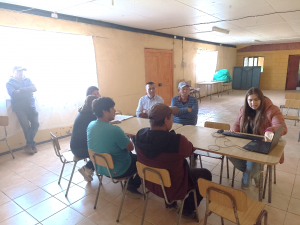 The researcher in charge, Msc(c) Denisse Torres, indicates that “the support and transfer has been improving, partly as a result of a more active participation of artisanal fishermen organization, demonstrating management empowerment , who are developing more activities and even carrying out a work plan associated with the APE.”
The researcher in charge, Msc(c) Denisse Torres, indicates that “the support and transfer has been improving, partly as a result of a more active participation of artisanal fishermen organization, demonstrating management empowerment , who are developing more activities and even carrying out a work plan associated with the APE.”
Press related links:
